News & Events in Belarus
Lukashenko updates price control tasks for Belarusian government
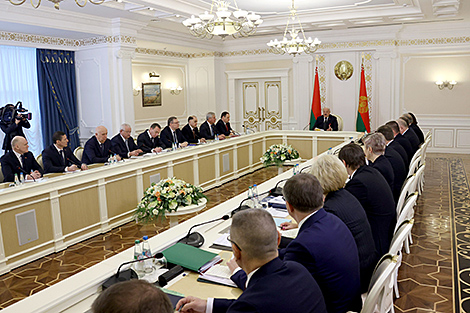
MINSK, 10 February (BelTA) – Belarusian President Aleksandr Lukashenko has hosted a government meeting to discuss the pricing in the country, review the implementation of previous orders in the area and set the next steps, BelTA has learned.
“The subject of our today’s conversation is complicated, and due to its complexity and other reasons, it is extremely unpleasant. I know very well, as well as many people present at this meeting today, what wages and prices are. It is an important issue for our people, for all of us, because every day from morning till night we face these issues and, of course, we live with them,” the president said. “We agreed that after some time we would get together and see how the government, the authorities of the country were carrying out the president's instructions. Someone was to establish a price monitoring system, which also meant monitoring of inflation in the country. Someone was to control the fulfillment of these tasks,” the head of state said.
Aleksandr Lukashenko drew attention to some facts and cited specific examples, so that “all sorts of very convenient thoughts” would not wander in the minds of “advanced” economists.
“We have all got used to the fact that ‘democracy and free market will save the world’. Where did that come from after a long period of declarative pricing in the Soviet Union and regulation of everyone and everything? Where did it come from? A rhetorical question. The Americans, the West have always pushed us toward this: democracy, democracy, human rights! Read: “I can do whatever I want. I can say whatever I want. Then there was the year 2020. This is all you need to know about democracy,” the head of state said.
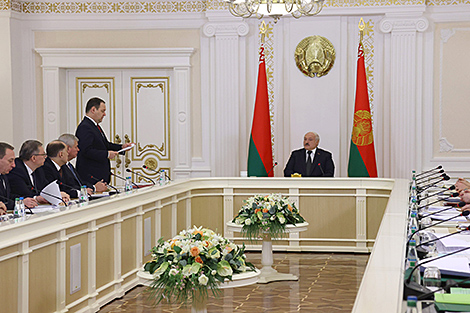
The president cited another example in this regard: “The United States of America used to reproach us for vote-rigging. However, the election results also caused protests and clashes there. How did it end? With a shooting. I always give you this eloquent example - they shot a young woman, who went to three or four wars to fight for the U.S. interests. It was not taken into account. No rights, no democracy. I do not condemn those defenders of the highest authority, of the building that was attacked. I do not condemn them. It is their business. But what were we condemned for?”
Another example, even more important for the market sector, is the sanctions that the West has imposed on the Russian Federation, and also on Belarus, so that Russia could not circumvent these sanctions through it. “Why there were price caps placed on the Russian Federation's main commodity. And not only on this one. I mean oil, and also oil products. Why did the West and the U.S. start to regulate the prices of oil and oil products? We have a market economy in the world, don’t we?” the head of state said.
On the need to live with one’s own minds and in the interest of the country
“I remind you of this and ask you to understand that we must live with our own minds in our country and do everything in the way that is beneficial to our people. Is it okay that we see unreasonable price hikes and the new rich, who appeared yesterday from God knows where, setting up their own networks in trade and so on to fill their pockets, when the wages of ordinary workers are at $500, while they have 46 or 60 times more? the Belarusian leader said.
“I want you to understand that my demand remains unchanged. I have proved to you by these two examples, and there are plenty of them, that they have no democracy, no human rights, no free market and free pricing. They act solely in their own interests. So let us, too, as far as possible, keep our own interests, our own people's interests first. In a social state where everything is for the people,” said Aleksandr Lukashenko.
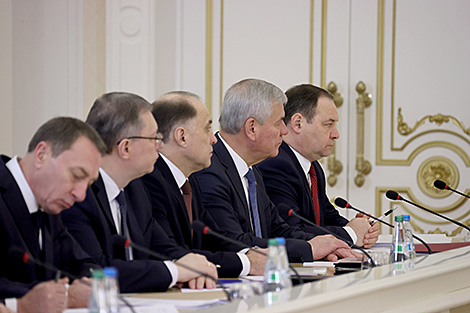
On the task to regulate prices
Aleksandr Lukashenko said that a task to develop measures to regulate prices in difficult economic conditions was set before the government four months ago. “This is the hardest work after many years of market permissiveness. I understand that it is not easy to curb prices when millions of people [both in Belarus and abroad] are interested in the lack of restraint to them. But we have enough power. We must use the advantages of our power. And we have probably done it to some extent. It would be impossible to solve this issue without serious work with the entire production and trade chain,” said the head of state.
To curb inflation, Directive No. 10 was signed first, and then Council of Ministers’ Decree No. 713 “On the price regulation system” came into force in mid-October.
According to Aleksandr Lukashenko, in some cases the prices even went down, although this was not the initial goal. But after their February surge last year, everything is good, and the profitability of organizations is still high. “Some are writing to me about lowering prices. We did not set such a goal. We were talking about regulating prices,” he said.
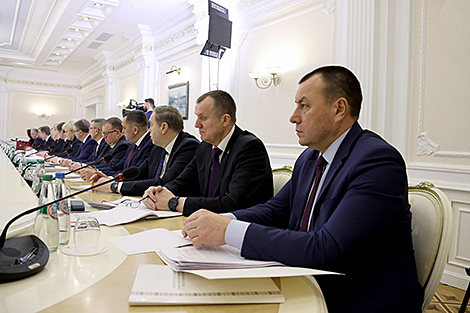
On current results and challenges
“The price regulation (or price control) system was developed together, in cooperation with the Parliament, the government, the State Control Committee, trade unions, local authorities, controlling and law enforcement agencies. I have the recent monitoring results. According to the statistics, we have managed to significantly slow down inflationary processes in the country. In Q4, after a decisive action in 2022, deflation was recorded at almost 2%. That means the prices lowered,” Aleksandr Lukashenko said.
“At our previous meeting, the government predicted annual inflation of about 20%. That would be a terrible inflation. However, taking into consideration the measures taken, we managed to reduce it to at least 12-13% by the end of 2022,” the Belarusian leader said.
There are goods that have become cheaper, the president noted. This list is quite long. This includes buckwheat, rice, pasta, vegetable oil, tea, natural coffee, perfumes and cosmetics, TV sets and so on.
“Staples however have become more expensive. These are milk, kefir, cottage cheese, other dairy products, butter, meat, eggs and even baby food. All this shows that the new regulation system requires further improvement and, as the government says, fine-tuning,” the head of state said.
The president said that he had gathered a wide range of participants to outline the next steps to restrain prices and keep the inflation under 7-8% in 2023. "This is almost two times lower than last year," he said.
Aleksandr Lukashenko also commented on the work of those responsible for price control and highlighted their shortcomings which are evident at this stage.
On the remaining issues
Firstly, retail prices are declining mainly due to retail, while the producer price index continues to grow. "This needs to be addressed. For example, from September to December of last year this figure in industry amounted to 100.7%, in agriculture - 103.6%. Agricultural products rose in price in the fourth quarter by almost 4%, industrial goods - by 1%," the Belarusian leader said.
Secondly, retail organizations continue to violate the pricing laws. "This happens against the background of inspections that detected violations for which more than 100 retail entities and officials were brought to responsibility and five dozen criminal cases were opened. It seems that the Ministry of Antimonopoly Regulation and Trade has stopped performing its direct duties, especially in the regions. So have MPs and auditors. Though one ministry will not be able to cope with this. This is the task of the entire government. It is not for nothing that I invited governors then and now. Without you, we will not solve this problem at all. Because retail is your domain," the head of state emphasized.
Thirdly, retail trade turnover is decreasing (96.3% in 2022 as against the level of 2021). "We prevented empty shelves and brought back the variety of assortment thanks to new suppliers, mainly from friendly Russia and Turkey. But this is not a reason to be complacent. Our citizens should be able to afford imported goods, especially those we do not produce ourselves," the Belarusian leader stressed. “Import should also be under the strictest control. Otherwise it may bring down the entire domestic market."
The president also inquired about the status of his instruction to look into salaries of managers and owners of large retail chains. Addressing the media, the head of state said: "Please, ask State Control Committee and the government about some salary cases. AS it runs out some ‘outstanding’ managers receive a salary 30-40 times higher than that of an ordinary salesperson and others. They love to complain and lament in social media about some crackdown thus stirring people for some unrest. But I already have experience on how to deal with them. Crackdowns will be hard. We need to show people. ‘Look,this is the salary of a salesperson - Br800 or 1,000 and this is the salary of the so-called owners - Br50,000-60,000’.”
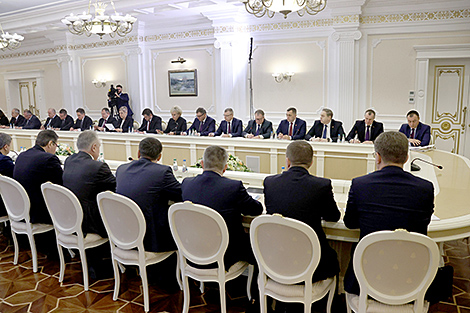
Fourthly, there are still questions with regard to the interpretation and practice of applying certain norms of Resolution No. 713.
Another problem is the unequal conditions for domestic producers and importers, which contributes to the sale of mainly foreign products. "Importers have the opportunity to form a favorable price outside the country and receive a large profit. Let's listen to how fair it is, and whether the government sees this problem," Aleksandr Lukashenko said. “I am well aware that any system of regulatory measures is a living organism that changes taking into account internal and external factors. Not everything depends on us in the country. But I do not want us to regulate the whole world. My task, and also yours, is to control the processes that are taking place within the borders of our Belarus. Sometimes it is permissible to accelerate positive changes, as they say, manually. That's what we're going to do today."
Starting the meeting, the president stressed that he was open to constructive proposals and was ready to make the decisions necessary for people. "The problem must be solved. People should not look sideways at the government. My main requirement, as you know, is to provide a wide range of goods at fair prices and to prevent shortages. This requirement applies to everyone," he said.


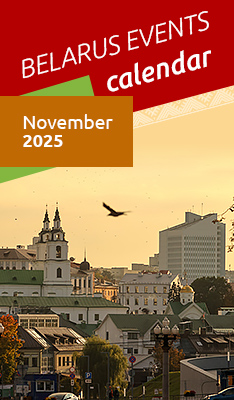




 print version
print version make home page
make home page add to bookmarks
add to bookmarks

